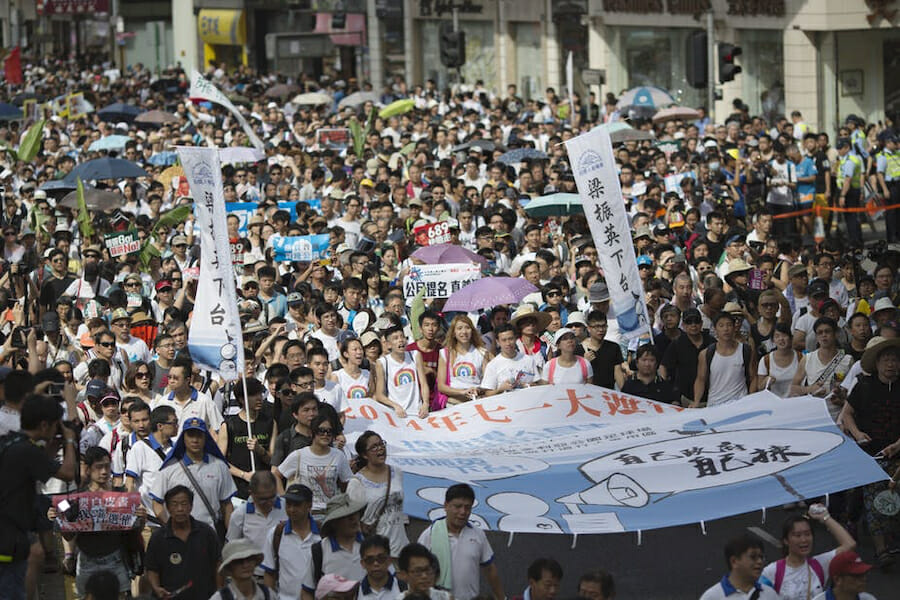
Street Protests Highlight Special Status Hong Kong Has – and How it Should Use It
Thousands of Hong Kong residents have taken to the streets to call for democracy and greater autonomy from mainland China. A 170,000-strong rally on July 1 followed hot on the heels of an informal referendum on electoral reform that took place from June 20-29. Hong Kong’s frustration with the mainland is clear, but it is better off treading the path of transition than revolution.
Since control of Hong Kong was handed back to China in 1997, the region’s chief executive has been elected by a committee that comprises 400 members in 1997 and 1,200 in 2010 – a far cry from democracy. Under pressure to make good on the promise of “Hong Kong governed by Hong Kong people,” Beijing has pledged universal suffrage by 2017 (the next election year), but with the added condition that all candidates are approved beforehand.
Although people in Hong Kong have an increasing role in choosing their leader compared to colonial times (when the governor was appointed by the British), intellectuals and pro-democratic groups feel that what Beijing has practised is at best a lukewarm democracy, the undercurrent of which is the encroaching control over local media and politics by Beijing.
Hong Kong’s simmering discontent was pushed to boiling point when Beijing recently published a white paper, reiterating the “One Country Two Systems” policy. It was confirmation that Hong Kong’s autonomy is only what Beijing is willing to give. Since 1991, Beijing has issued 87 white papers regarding human rights and foreign policy, but this is the first one to address Hong Kong. It was interesting timing, considering the initial referendum discussions took place in June, a 100,000 strong crowd gathered in Hong Kong on June 4 to commemorate the Tiananmen Square crackdown and the recent disputes in the South China Sea.
Hong Kong’s economic stability since its takeover may have been the vital factor that has given Beijing the confidence to act so bullishly. Hong Kong’s GDP growth was predicted to be 3-4% in 2014, with an unemployment rate of all-time low at 3.1%. In comparison, America had a GDP growth of 1% in the first quarter of 2014, and an unemployment rate of 6.3%. In addition, the Gini coefficient, a commonly used indicator of inequality shows little change in Hong Kong since the handover. But, Beijing must tread carefully, as economic and political stability often go hand in hand.
Although the June referendum was dismissed by Beijing as unofficial, illegal and invalid. Yet it received 792,808 votes, 42% of whom supported a public vote with open nomination of candidates. That is hard to ignore. In a democratic world, elections and polls are deemed the most important indexes for gauging public opinion. The number represents 22.6% of Hong Kong’s registered electors, with 9.5% supporting the open nomination.
These numbers shouldn’t be taken as a given, however. Out of the 792,808 votes, more than 720,000 were received online or mobile and 70,000 in poll stations. How vigorously observed were the voting criteria? Could people use pseudonyms? If so, it is possible there was plural voting. Plus, how many station voters may have already voted online and was there an age limit for voters? Statistics are unavailable.
The majority of those demonstrating on July 1 were young people, who took to the streets chanting: “This Hong Kong is not the Hong Kong we know of, this Hong Kong is not the Hong Kong we are proud of.” Some marchers were as young as 17 and not even born when the handover took place. Nevertheless, the youth of Hong Kong seem to have a revolutionary fervour for full democracy, against Beijing’s authoritarian policy.
In the midst of this mounting tension, Dankwart Rustow’s transition model could perhaps provide reference for a way forward for Hong Kong and the Chinese mainland. He broadly defines transition as “the interval between one political regime and another.” He emphasises one particular path for transition that is neither violent nor revolutionary but proceeds through negotiations between the outgoing authoritarian regime and its democratic opposition. The process often relies upon formal or informal pacts or agreements that provide security guarantees to both sides. Hong Kong’s desire to rinse clean all authoritarian attachments is unrealistic, as it would be too wide a river for Beijing to cross.
But, it’s worth remembering that the peaceful rally on July 1 is something that would never have been allowed to happen on the mainland. This illuminates Hong Kong’s special status within the PRC and that it is a place where China’s capability to allow alternatives can be showcased. Therefore, Hong Kong should take full advantage of its unique position, use the referendum for leverage and negotiate with Beijing for transition, rather than a revolution.
This article was originally published on The Conversation. Read the original article.
